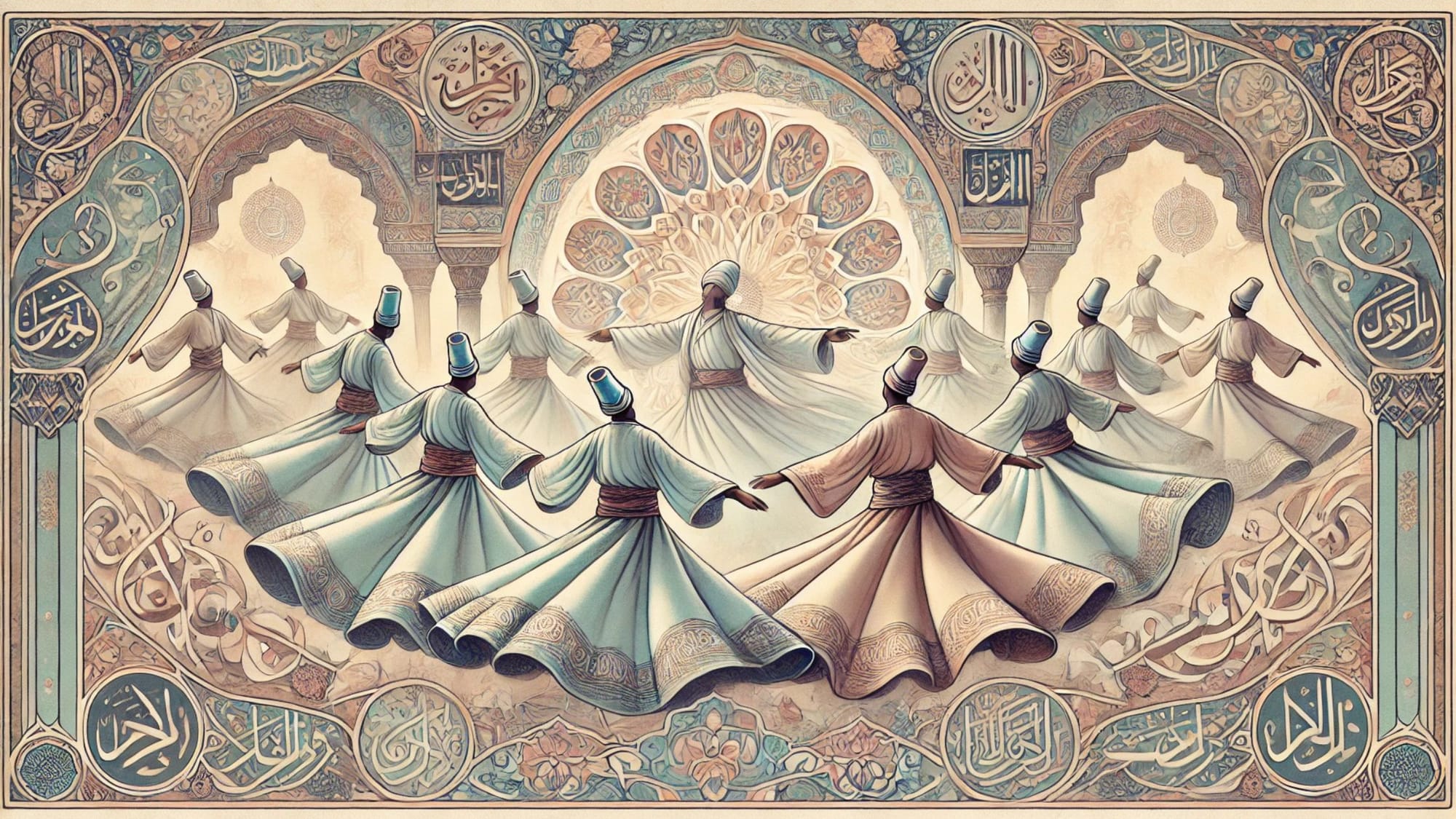Introduction To Sufism: Discover The Mystical Side Of Islam

Sufism has made a significant impact all over the world. Its teachings resonate across various cultures, influencing worldwide art, poetry, and music.
Figures like Rumi, whose poetry speaks to universal themes of love and longing for God, have contributed to Sufism’s global appeal.
From the mesmerizing whirls of the dervishes in Turkey to the soulful music of the qawwali in South Asia, Sufi mysticism has left an indelible mark on many regions' cultural and spiritual landscapes.
Table of Contents
What Is Sufism?
Sufism is the mystical and spiritual path within Islam that focuses on seeking a direct, personal experience of the Divine. It emphasizes inner transformation, self-awareness, and a deep connection with God, aiming to purify the soul and foster spiritual enlightenment.
Sufis believe that through love, devotion, and self-discipline, one can achieve unity with the Divine and uncover the deeper meaning of existence.
While Sufism originates within Islam, its practices and teachings extend beyond traditional religious boundaries. Rooted in the core principles of Islam, such as the oneness of God (Tawhid), Sufism seeks to enrich the experience of faith by emphasizing the inner, experiential aspects of worship, often through personal reflection, prayer, and rituals.
- Rumi
Read Also:

What Are The Core Principles Of Sufism?

1. Unity with God (Tawhid)
At the heart of Sufi belief is Tawhid, the concept of the absolute oneness of God. Sufis view this oneness as not merely an abstract theological idea but as a lived experience, one that transcends the intellectual understanding of God’s unity.
For a Sufi, Tawhid means that God is the only true reality, and everything in existence—be it material or spiritual—emanates from Him. The ultimate goal of Sufism is to experience this oneness with God directly, to dissolve the boundaries between the self and the Divine.
For Sufis, love plays a vital role in this journey towards unity. Love for God is the driving force that propels the seeker towards spiritual perfection.
The Sufi path is often described as a path of divine love, where devotion, submission, and longing for God's presence are key. The famous Sufi poet Rumi expressed this sentiment beautifully when he wrote, "My heart is so small, it's almost invisible. How can you place such a large love in it?"
2. Purification of the Heart
Sufism emphasizes the importance of inner transformation, achieved through the purification of the heart.
The heart is seen as the seat of the soul, and only a pure heart can truly experience divine love and communion with God. To purify the heart, Sufis engage in various practices of self-discipline and moral reflection.
Some of the key concepts involved in this purification are:
- Tawbah (Repentance):
A central concept in Sufism, Tawbah is the process of sincere repentance for past wrongdoings, seeking forgiveness from God, and striving to live a more virtuous life. Through repentance, the heart is cleansed, and the seeker moves closer to God. - Sabr (Patience):
Patience is essential on the Sufi path, especially in the face of hardship and trials. Patience is not just passive endurance but an active surrender to God’s will, trusting that every moment is an opportunity for spiritual growth and divine connection. - Tawadu (Humility):
Humility is considered one of the most important virtues in Sufism. Sufis believe that true spiritual progress requires the seeker to rid themselves of pride and ego, recognizing that everything—every blessing, every breath—comes from God. By cultivating humility, the Sufi becomes more receptive to God’s presence.
These practices, along with others such as gratitude (Shukr) and contentment (Qana’ah), are integral to the Sufi journey of inner purification and spiritual enlightenment.
- Rumi
Sufi Practices and Rituals
1. Dhikr (Remembrance of God)
One of the central practices in Sufism is Dhikr, the remembrance of God. Dhikr involves the repetition of God's names and attributes, either silently or aloud, with the intention of deepening spiritual awareness and fostering a direct connection with the Divine.
This practice is believed to purify the heart and mind, gradually eradicating distractions and ego. Through repeated invocation, Sufis aim to center their consciousness on God, moving beyond the ordinary realm of thoughts and entering a state of spiritual presence.
The most common form of Dhikr involves reciting phrases like "La ilaha illallah" (There is no god but God) or "Subhanallah" (Glory be to God), but it can also involve chanting or calling out specific divine attributes.
This practice can be done individually or within a group setting, and it often includes rhythm, breath control, and movement to deepen the experience. In group settings, Dhikr is often accompanied by music or chanting to enhance the spiritual atmosphere.
2. Whirling Dervishes
The Whirling Dervishes, perhaps the most iconic image of Sufism in the West, practice a ritual known as the Sema, which involves a form of spinning or whirling in a meditative trance. This practice is most famously associated with the Mevlevi Order, founded by the followers of the great Sufi poet Jalal al-Din Rumi.
The act of spinning is much more than a physical movement. It symbolizes the journey of the soul toward God, reflecting the Sufi belief that the soul must revolve around the Divine.
As the Dervishes whirl, they experience a sense of detachment from the material world, reaching a state of spiritual ecstasy and unity with the Divine. The movement also represents the rotation of the planets and the natural order, demonstrating that everything in the universe is in constant motion toward God.
The Sema ceremony is not merely an external performance but a profound spiritual act that brings the practitioner into a deep, transcendent state of love and devotion. For the Whirling Dervishes, the whirl is an act of submission and surrender to the Divine, seeking the ultimate union with God.
3. Sufi Meditation
Sufism includes several forms of meditation, both silent and verbal, that aim to deepen spiritual insight and foster a closer connection with God. These practices help the practitioner transcend the limitations of the ego and reach a state of inner peace and heightened spiritual awareness.
- Silent Meditation:
Silent meditation, or muraqabah, involves sitting quietly in contemplation, focusing on the presence of God and the heart’s connection with the Divine. It encourages mindfulness and deep reflection on the self and its relationship to God. Through muraqabah, the Sufi seeks to quiet the mind, allowing divine insights to arise naturally and fostering a state of divine presence. - Verbal Meditation:
In contrast, samaa or listening to spiritual poetry and music can also be a form of verbal meditation. This practice often involves reciting poems (especially those of Rumi and other Sufi poets) or engaging in a musical experience, such as chanting, that allows the heart to open and become receptive to divine truths. The rhythmic nature of the recitations and music facilitates a shift in consciousness, bringing the seeker into a meditative state of divine awareness.
What Is The Key Sufi Teaching?

In Sufism, love is not just an emotion but a central spiritual force, considered the path to union with God.
For Sufis, love is the ultimate means of transcending the ego and the material world. This love is not a simple affection; it is a profound, spiritual longing that propels the seeker toward the Divine.
The Sufi view of love is deeply intertwined with the concept of Divine Union, where the soul yearns to return to its source—God.
This longing is reflected in the famous words of Rumi, one of the greatest Sufi poets: "The wound is the place where the Light enters you."
In Sufism, love often begins with the experience of longing or "separation" from God. This longing is seen as a form of spiritual pain, but it is also a source of deep devotion and surrender.
Through love, the Sufi seeks to dissolve the self and merge with the Divine, transcending all worldly attachments and desires.
- Rumi
Who Are Famous Sufi Masters?

Sufism has been shaped and enriched by countless mystics, philosophers, and spiritual leaders who have passed on their teachings.
Here are a few of the most influential figures whose insights have left a lasting impact on Sufi thought and practice:
Rumi (1207–1273)
Perhaps the most famous of all Sufi mystics, Jalal al-Din Rumi is known for his deeply spiritual poetry, which expresses his longing for union with God. His works, particularly the Divan-e Shams-e Tabrizi and the Masnavi, continue to inspire millions of people worldwide.
Rumi emphasized the importance of love as the means to experience God’s presence, often describing the spiritual path as a journey of love, where the soul seeks to overcome the self and merge with the Divine.
His famous words, "Don’t grieve. Anything you lose comes round in new form." capture the essence of his teachings on transformation, love, and spiritual evolution.
Ibn Arabi (1165–1240)
Known as the "Greatest Master" in Sufi circles, Muhyiddin Ibn Arabi was a philosopher, poet, and mystic whose teachings on Unity of Being (Wahdat al-Wujud) are central to many Sufi schools.
Ibn Arabi believed that all of existence is a manifestation of God's essence, and the ultimate goal of human life is to realize this unity. He taught that the Divine is both immanent and transcendent, and by seeing the Divine presence in everything, the seeker can attain spiritual realization and union with God.
His works, such as The Meccan Revelations, offer profound insights into the nature of reality, the soul, and God’s relationship with creation.
Al-Ghazali (1058–1111)
A renowned scholar and theologian, Al-Ghazali played a key role in integrating Sufism with orthodox Islamic thought. His writings, particularly The Revival of the Religious Sciences (Ihya' Ulum al-Din), explore the importance of spiritual practice in Islam and emphasize the necessity of inner purification.
Al-Ghazali’s work helped to reconcile Sufism with traditional Islamic theology and law, demonstrating that the mystical path was not separate from mainstream Islam but deeply connected to it. His emphasis on the purification of the heart and the importance of intention in all actions remains a central theme in Sufi practice.
Read Also:

Conclusion
Sufism is a spiritual path focused on love, personal growth, and directly experiencing God. It teaches that through love and devotion, we can grow closer to the Divine and understand our true selves. Key practices like remembrance of God (Dhikr), whirling, and meditation help connect the heart with God and bring inner peace.
To explore Sufism, start by reading Sufi poetry, like the beautiful writings of Rumi, which express deep love and longing for the Divine. You could also attend a Sufi gathering or dhikr session to experience the peaceful, mystical energy firsthand.
Sufism invites everyone to seek spiritual wisdom and inner harmony, making it a powerful and transformative journey for those looking to deepen their connection with themselves and the Divine.
FAQs
1. What is the main belief in Sufism?
The main belief in Sufism is the pursuit of a deep, personal connection with God through love, devotion, and inner purification. Sufis emphasize the oneness of God (Tawhid) and aim to experience God’s presence directly, seeking spiritual growth through practices like remembrance of God (Dhikr), meditation, and self-reflection.
2. How is Sufism different from Islam?
Sufism is not separate from Islam, but rather a mystical and spiritual approach within it. While mainstream Islam focuses on following the Five Pillars of Islam and adhering to religious law (Sharia), Sufism emphasizes the inner dimensions of faith, focusing on personal experiences with the Divine and cultivating a deeper, more intimate connection with God through practices like love, devotion, and spiritual discipline.
3. Why do Muslims disagree with Sufism?
Some Muslims disagree with Sufism because they believe its practices, such as rituals, veneration of saints, and focus on personal spiritual experiences, may deviate from traditional Islamic practices and teachings.
Critics often view these practices as distractions from the core teachings of Islam, while others see them as a legitimate way to deepen one’s faith.
4. What God does Sufism believe in?
Sufism believes in the same God as Islam—the One God (Allah in Arabic). Sufis emphasize Tawhid, the oneness of God, and aim to experience His presence in their lives through love and spiritual practices.
For Sufis, God is not just a distant creator but a presence to be directly experienced, loved, and connected with on a deep, personal level.


